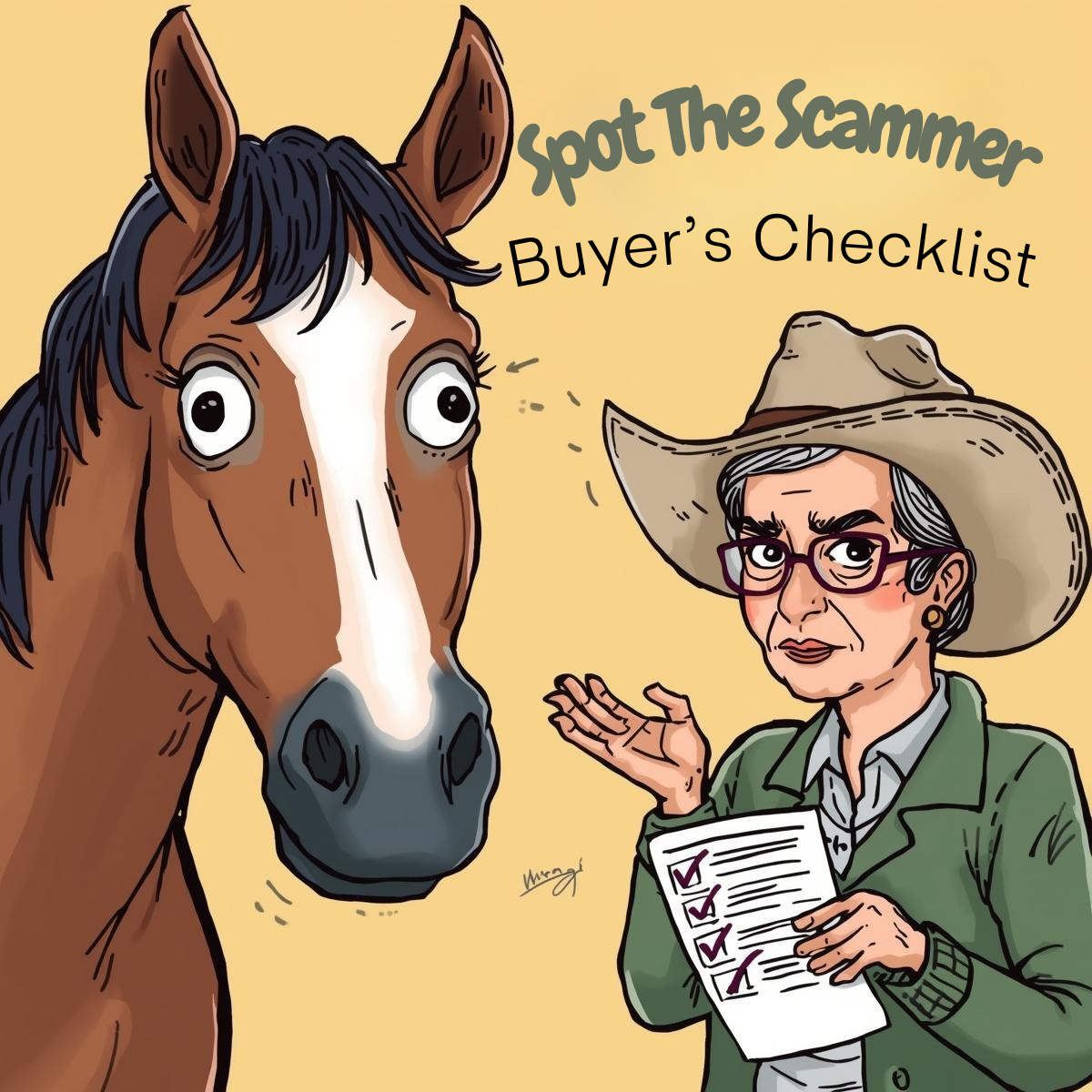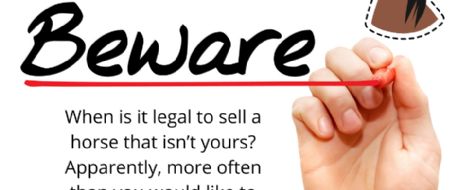The Smart Buyer's Checklist for Spotting Horse Scams Online
Buying a horse online requires diligence to avoid scams and ensure the horse is a good fit. You can vet a seller by identifying red flags, asking specific qualifying questions, and verifying all documentation with independent third parties.
Signs of a fraudulent online horse seller often involve pressure tactics, secrecy, and unusual requests designed to rush you into an unsafe transaction.
How to Know if the Seller Is Honest (Red Flags)
Be alert for these warning signs:
- Pressure Tactics: The seller creates a sense of urgency, insisting you must buy immediately or a deposit is required to "hold" the horse for a viewing/vet check.
- Poor Communication: They only communicate via text or email, refuse phone calls, or avoid video calls (e.g., FaceTime) to show themselves with the horse in real-time.
- Inconsistencies: The horse's description in the ad doesn't match the photos or videos, or the seller's story about the horse's history changes.
- Unusually Low Price: The price is significantly below market value for the horse's described breed, age, and training level. If the deal seems too good to be true with a significantly below market value, then it may be too good to be true.
- No Pre-Purchase Exam (PPE): The seller barks at the mention of an independent PPE by your chosen vet (not theirs).
- Horse is "Ready to Ride": Upon arrival, the horse is already tacked up or sweaty, suggesting the seller worked the horse beforehand to mask behavioral issues.
- Vague Information: They cannot provide the horse's exact location, current vet's contact information, or references from previous buyers.
- Suspicious Payment Methods: They ask for payment via wire transfer, gift cards, or other unsecured methods.
How to Know the Horse Belongs to the Advertiser (Ownership Confirmation)
- Request Ownership Transfer History: If the horse is registered with a breed association (e.g., AQHA for a Quarter Horse), request an official ownership history report. This confirms that the seller is either the legal owner or the designated decision-maker for the owner in the breed registry. Keep in mind that breed registrations are generally not accepted as legal proof of ownership in court.
- Review Paperwork: A legitimate seller should easily provide you with all necessary documentation, including a bill of sale, breed association transfer forms, and health records.
- Contact Previous Owners: If possible (information may be in the horse's passport/papers), contact previous owners to confirm the history the current seller provided.
Qualifying Questions to Ask the Seller
A genuine seller will want to find the best home for their horse and won't mind answering many questions.
Basics & History:
- How long have you owned the horse, and why are you selling it?
- What is the horse's full history (previous owners, training, discipline)?
- Is the horse registered? Can I see the papers?
- Does the horse have any vices (cribbing, weaving, etc.)?
Health & Care:
- Who is your current vet, and will you authorize them to release the horse's medical records to me?
- When was the last farrier visit, and are there any hoof issues?
- Does the horse have any known illnesses, injuries, or maintenance requirements?
- What is their current feeding regimen and daily routine (turnout, with other horses, etc.)?
Temperament & Riding:
- How would you describe the horse's general temperament and personality?
- What level of rider is this horse suitable for?
- Will you ride the horse first when I come to view it?
- How does the horse respond to trailering, clipping, and bathing?
Recommendations
- Involve a Professional: Work with an experienced trainer or horse person to help you evaluate potential horses and sellers.
- Trust Your Gut: If something feels off, walk away.
- Get a Written Contract: Always put all terms and conditions in writing with a clear purchase and sale agreement to protect yourself legally. You can find adaptable templates, such as the sharing contract available on the British Horse Society website.
- Don't Buy Unseen: Never purchase a horse without you, your representative, or an independent vet seeing it in person.
- Arrange a PPE: Insist on an independent pre-purchase veterinary exam.
What About Grade Horses?
For a grade horse without registration papers, you must rely on other documentation and records to confirm the seller's ownership and the horse's history.
Primary Documents for Ownership Proof
The most important document for a grade horse is a comprehensive, signed Bill of Sale.
- Detailed Description: Ensure the bill of sale includes a detailed description of the horse: name (if any), approximate age, sex, color, specific markings, brands, scars, or any other distinguishing features. The more detailed the description, the better.
- Seller Information: It must have the full legal name, address, and contact information of the seller, and a statement that the seller is the legal owner and has the right to sell the horse.
- Signatures and Date: Both you and the seller must sign and date the document. Having a witness or getting it notarized can add further legal weight.
Supplemental Documentation and Records
In the absence of registration papers, a collection of other records helps establish a chain of ownership and the horse's history. Request copies of everything the seller has:
- Veterinary Records: Coggins test results (which typically list the owner's name and address), vaccination records, dental exams, and any surgical or injury reports.
- Farrier Records: Receipts or notes from farrier visits.
Purchase Receipts/Bank Statements: Evidence of the seller paying for the horse or its upkeep (feed, board, tack) in their name. - Health Certificates/Passports: Any health certificates, especially if the horse has traveled across state lines.
- Microchip Verification: If the horse is microchipped, ensure the seller can provide the microchip number and the information is registered in their name with the relevant database. This is a strong, de facto proof of ownership.
- Photos and Videos: Extensive photos and videos of the horse with the seller or at their property can help confirm possession.
Qualifying Questions for the Seller
Focus your questions on their history with the horse to look for inconsistencies:
- "When and where did you acquire this horse, and do you have the bill of sale from the previous owner?"
- "Who is your current veterinarian and farrier? Will you sign a release so I can access the horse's full medical history?"
- "What specific markings or scars does the horse have that I should look for during the pre-purchase exam?"
- "Can you show me a recent Coggins test with your name as the owner?"
A legitimate seller will have no problem providing this documentation and will be eager to ensure the horse goes to a responsible buyer. If the seller is hesitant or can't produce these items, it is a significant red flag. Always involve an experienced horse professional to help you with the evaluation.
If you notice any of these signs, trust your instincts and walk away from the transaction. Working with an experienced horse professional is highly recommended to help you navigate the process safely.
Stolen Horse International provides news and other resources for free on this website. As a charitable organization we survive on the kindness of people like you. Please consider donating to help fund the organization or purchasing a NetPosse ID for your horse, dog or cat to help protect your beloved animals!
Debi Metcalfe






Comments